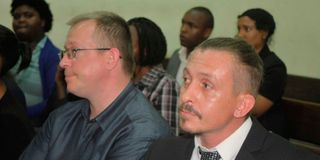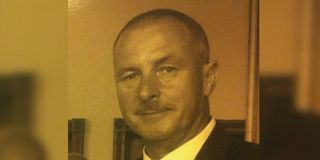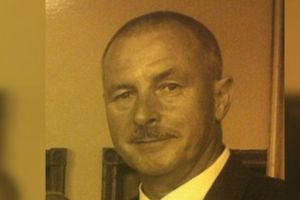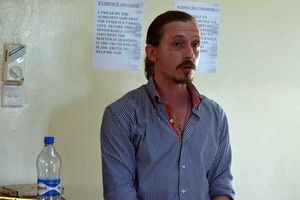
Richard John Veevers (right) and his brother Philip Veevers (left) listen attentively during the inquest into the death of their father Harry Roy Veevers at the Mombasa Law Courts on May 4, 2017.
The family of British tycoon Harry Roy Veevers will next month know whether his body will be flown to the United Kingdom for reburial, and whether anyone will be held responsible for his sudden death in Mombasa on the eve of Valentine’s Day in 2013.
This follows the conclusion of the final inquest rehearing before Mombasa Senior Resident Magistrate David Odhiambo, who heard arguments from lawyers representing the deceased's sons, Richard John Veevers and Philip David Veevers, as well as those representing his daughters.
Roy died on February 14, 2013 in Mombasa, and the cause of his death, along with suspicions of foul play, has remained the subject of protracted judicial proceedings for more than a decade.
His sons have been in conflict with their half-sisters, Alexandra and Hellen Veevers, and their mother Azra Parvin Din, over what they believe was an unnatural cause of death.
In their final submissions, the deceased's sons, through their advocate Kinyua Kamundi, urged the court to find that their father did not die of natural causes and that those responsible for his death be identified and prosecuted.

Harry Roy Veevers, 64, from Rochdale, UK died at his home in Kenya in 2013.
The inquest file had been returned to the magistrate’s court after the High Court directed it’s reopening, ordering that a proper judgment be delivered to determine whether anyone was culpable in Roy’s death.
Justice Anne Ong’injo found numerous irregularities in the initial handling of the matter, ruling that the file be reopened to allow for proper submissions and a ruling grounded in the evidence presented by witnesses and advocates.
It emerged that Principal Magistrate Charles Ndegwa, who had earlier handled the matter, delivered a ruling without notifying the advocates, particularly the one representing the deceased’s sons, despite a pending request for certified copies of the proceedings for purposes of filing submissions.
The judge further observed that there was no indication the typed proceedings had been supplied to Mr Kamundi.
Additionally, there was nothing on record to confirm that the file had been properly forwarded to Mr Ndegwa for him to assess the witnesses’ testimonies and deliver a considered ruling.
Justice Ong’injo consequently referred the inquest file back to the magistrate’s court for fresh consideration.
By a letter dated February 7, 2024, Richard and Philip asked the High Court to call for the inquest file and revise a ruling by Principal Magistrate Charles Ndegwa dated December 23, 2023 and delivered on January 15, 2024.
They asked that the ruling be declared null and void, the inquest reopened, and fresh judgment delivered after full consideration of oral and documentary evidence and submissions from all parties.
They argued that suspects in the unlawful death of their father, who allegedly concealed the body and buried it under a false name without a post-mortem, applied to have the body released to them.
They also raised concerns that a scientist in the United Kingdom holding specimens related to the inquest might dispose of them, hindering plans to conduct a fresh inquest by a UK Coroner once the body arrives.
The brothers noted that succession cases before the Family Division of the High Court in Mombasa have remained stayed for a decade, pending conclusion of the inquest, and urged the court to act so that those proceedings can resume.
They intend to rebury their father at Rochdale, Greater Manchester.
In response, the widow Azra Parvin Din and her daughters Alexandra and Hellen defended the magistrate’s ruling, arguing that it lawfully concluded there was no concrete evidence to prove criminal responsibility in Roy’s death.
Their lawyer William Mogaka dismissed the sons’ application as speculative and a belated attack on the magistrate.
Mr Ndegwa had concluded the inquest in January 2024, stating no evidence linked any person to the death. However, Richard and Philip contested the handling of the proceedings, accusing the magistrate of failing to evaluate all the evidence from 16 witnesses, over 300 typed pages, and 40 exhibits.
They maintained that the magistrate misunderstood the purpose of an inquest, which is investigative, not criminal.
They cited issues such as failure to notify police, tampering with the scene, burial without post-mortem, switching of specimens, and altering their father’s identity to a Muslim name, Akbar Harry Roy Veevers, as indicators of cover-up and misconduct.
Richard, the firstborn, insists he should take charge of the reburial, arguing that Parvin was neither married to his father nor a Christian, and therefore unfit to handle the burial.









